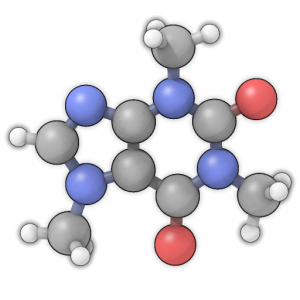Time-tested stimulant caffeine is a cheap and effective pre-workout aid.

- Improve exercise performance. Athletes are able to run longer and faster and perform more repetitions after taking caffeine.
- Reduce perceived exertion, allowing for greater tolerance of fatigue when working out.
- Promote wakefulness and alertness, which may indirectly aid exercise performance.
- Enhance cognition, highlighted by improved reaction time and decision-making.
Overview
Caffeine is a natural stimulant usually taken in the form of coffee, tea, or soft drinks by billions of people around the world. It is also present in a large variety of over-the-counter medications and dietary supplements. Caffeine’s main effects are improved wakefulness, focus, and brain activity.
Coupled with its safety record, it is no surprise that caffeine is such a popular substance. It is also one of the most heavily-researched compounds and even has its own research journal.
Although caffeine is mainly used to promote alertness and wakefulness, it is also incredibly popular as an ergogenic aid and is used by athletes in multiple disciplines. Indeed, according to one estimate, caffeine is taken by 74% of elite athletes.1
Decades of research demonstrate that caffeine offers significant and reliable exercise performance benefits.

How Caffeine Might Help Pre-Workout Formulas
Caffeine has a wide array of effects on the body, and researchers are still working on describing exactly how it achieves its beneficial actions.
CNS Stimulation
Thus far, the most trusted mechanism is caffeine’s stimulation of the central nervous system (CNS). In particular, caffeine inhibits adenosine, a neurotransmitter responsible for making you feel sleepy, while increasing serotonin and dopamine – two neurotransmitters associated with happiness and well-being.2
This stimulation is believed to be the primary mechanism responsible for caffeine reducing the perception of fatigue, pain, and discomfort during exercise, as well as improving wakefulness, focus, reaction time, and overall cognitive function.
Potential interaction with adenosine receptors
It is also possible that caffeine affects adenosine receptors found in skeletal muscle, improving its ability to generate force and power.3 4
Caffeine’s Pre-Workout Benefits
Caffeine is a popular pre-workout stimulant, taken as coffee or a dietary supplement. Caffeine is a particularly common ingredient in bodybuilding pre-workout formulas.
The benefits of caffeine include improved exercise performance, lower perceived exertion, and an overall improvement of cognitive function, including enhanced wakefulness, focus, reaction time, and decision-making.
Aerobic Exercise
Caffeine’s benefits for aerobic exercise — particularly of 30 to 60 minutes in duration — are well documented and supported. Caffeine has been consistently shown to increase time to exhaustion during endurance activity, and some studies have also found caffeine to decrease the time needed to complete a set distance in an endurance event, such as 1.2% faster finish time during an 8 km run.5
Anaerobic Exercise
In addition, caffeine also appears to enhance anaerobic training. For resistance training/bodybuilding in particular, the most consistent benefit of caffeine is a higher number of repetitions before fatigue.6
However, research findings in this area are not as conclusive as endurance training. This may be because performance improvements during short, intense exercise are small and difficult to measure, and because different mechanisms of action may be responsible.
Other Benefits
Caffeine is also believed to reduce perceived exertion during exercise, which results in higher tolerance for discomfort and fatigue. In turn, this likely contributes to the improved performance seen in both aerobic and anaerobic exercise following caffeine ingestion.
Furthermore, caffeine is also known to stimulate wakefulness and make you feel more energetic and alert.
Finally, one less discussed benefit of caffeine may be improved reaction time, accuracy, decision-making, and overall cognitive performance, which is particularly useful for team sports where players have to make split-second decisions and changes of direction and speed.7
Research
Animal Research
Animal trials of caffeine as an ergogenic aid are relatively scarce, given its safety and efficacy in human s. Nonetheless, specific findings in rats indicate that caffeine may:
- Increase time to exhaustion during endurance exercise10
- Spare muscle glycogen and increase use of fatty acids for energy, prolonging time to fatigue11
Human Research
Decades of caffeine research have attested to its efficacy and safety as a pre-workout supplement.
Caffeine pre-workout (6 mg/kg) appears to slightly improve endurance during resistance training
The goal of this double-blind study was to investigate the effects of caffeine ingestion on resistance training performance. Thirteen men and 4 women with previous strength training experience were given either placebo or caffeine (6 mg/kg body weight) 1 hour prior to a training session including sets of bench press and leg press exercises to failure.
Although no major differences were seen for the bench press, taking caffeine during leg presses led to higher reps during the 3rd set (average of 12.5 reps vs 9.9 for placebo).
- The researchers concluded that “within certain limitations, caffeine has an ergogenic effect during short-duration high-intensity (anaerobic) exercise…subjects were able to complete more repetitions without altering subjective feelings of acute fatigue (RPE) or overall fatigue after the completion of the entire exercise bout”12
Caffeine pre-workout (6 mg/kg) may improve reaction time and decision-making during team sports
This randomized, double-blind study investigated the effect of caffeine on reaction time and decision-making during team sports. Ten male team-sport athletes took caffeine (6 mg/kg body weight) or placebo 1 hour before an 80-minute intermittent running exercise. They also completed a reactive agility test (RAT) that examined an individual’s ability to react to stimuli and perform a sudden change in speed and/or direction. The protocol was repeated again to make sure all athletes tried both placebo and caffeine.
Caffeine was found to improve test time by 2.3%, reactive agility time by 3.9%, movement time by 2.7%, decision time by 9.3%, and decision-making accuracy by 3.8% compared to placebo.
- The researchers concluded that “a 6-mg·kg dose of caffeine resulted in small beneficial improvements in RAT…Furthermore, qualitative results from this study also demonstrated a likely ergogenic effect of caffeine ingestion on decision-making accuracy. In addition, a likely benefit of caffeine ingestion on RAT performance when participants were either fresh or fatigued was suggested”13
Caffeine appears to reduce perceived exertion and improve performance during exercise
This frequently-cited meta-analysis paper reviewed 21 studies that examined the effect of caffeine on rating of perceived exertion (RPE)—a way of measuring how much an individual feels their body is working during physical activity. The review found that caffeine reduced RPE by an average of 5.6% and improved exercise performance by 11.2% compared to placebo.
- The authors concluded that “The results have quantified the suggestions in the literature that caffeine reduces RPE obtained during exercise. Moreover, there is evidence that the reduction in RPE may partly explain the ergogenic effects of caffeine”14
Caffeine pre-workout (5 mg/kg) may improve sprint running performance
This randomized, double-blind study examined whether caffeine can improve sprint running performance. Twenty-one physically active men performed a baseline 12×30 meters sprint running test with 35 seconds of rest in between. A few days later, they were assigned to take either placebo or caffeine (5 mg/kg body weight) 1 hour before repeating the same exercise. Caffeine resulted in a 1.4% (0.06 seconds) improvement in the fastest sprint time.
- The researchers concluded that “the results of this study suggest that caffeine has ergogenic properties with the potential to benefit performance in both single and multiple sprint sports”15
This double-blind study examined at the effects of caffeine on team sports performance. Ten amateur male team-sport athletes completed two 36-minute cycling tests, where they sprinted for 4 seconds and then cycled at lower speeds for 2 minutes a total of 18 times. The exercise was done 60 minutes after taking either caffeine (6 mg/kg body weight) or placebo; the two trials were separated by a week.
The caffeine trial had 8.5% greater total sprint work in the first half of the cycling test, and 7.6% in the second half. Athletes also had higher average peak power of 7% and 6.6% in the first and second half.
- The researchers concluded that “acute ingestion of a moderate dose of caffeine can improve the performance of an intermittent-sprint exercise test designed to simulate the physiological demands of team-sport athletes”16
Caffeine pre-workout (9mg/kg) may improve endurance exercise performance
This study examined the effects of caffeine supplementation on endurance exercise. Eight participants cycled until they reached exhaustion 1 hour after taking placebo or caffeine (9 mg/kg body weight). The two trials were separated by a week. The caffeine trial resulted in a significantly longer time until exhaustion (96.2 minutes vs 75.8 for placebo).
- The researchers concluded that “the ingestion of a high-caffeine dose 1 h before prolonged exercise decreases muscle glycogenolysis by 55% in the initial 15 min of exercise at 80% VO2 max. The spared glycogen is available during the later stages of exercise, resulting in a prolonged time to exhaustion”17
Pre-Workout Dosage
- Doses of anywhere from 3 – 6 mg per kg of body weight appear to be optimal
- Higher doses (9 – 13 mg/kg) are generally not recommended, because they have been consistently shown to elicit the same effects as 6 mg/kg
- Standalone caffeine supplements typically come in 200 mg capsules or tablets
- Multi-ingredient pre-workouts provide 150-250 mg caffeine per serving
- Research suggests that the best time to take caffeine is approximately 1 hour prior to a workout; this timing allows caffeine to reach maximum concentrations in the blood
- Taking multiple doses of caffeine during exercise does not appear to be any more effective than a single pre-workout dose
Supplements in Review Says
- Caffeine 3 – 6 mg/kg before a workout.
Caffeine is a cheap, safe, and effective pre-workout supplement. Given decades of overwhelmingly positive research findings, caffeine is a must-have addition to any pre-workout stack.
Most people take caffeine as part of a multi-ingredient pre-workout formula. However, it’s also perfectly fine to take caffeine by itself as a pill, or even as a cup of coffee.
Leave a Reply